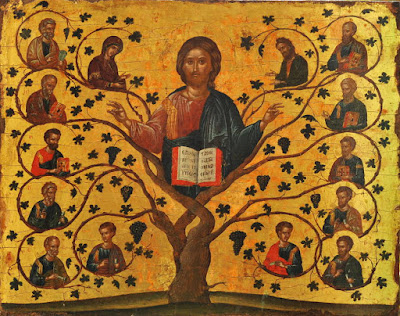I Am
the Vine, You Are the Branches
Jn
17: 1- 8
Fifth
Sunday of Easter
The prophet Isaiah spoke of God as one who had a vineyard
on a very fertile hill. He dug it and cleared it of stones and planted it with
choice vines; he built a watch-tower in the midst of it and hewed out a wine
vat in it; he expected it to yield grapes, but it yielded wild grapes ( Isaiah
5: 1 – 2).
In our reading today, we see God once more described as one who
takes care of the vine. He pays particular care of the vine so that it can
yield fruits. What is new, however, in our gospel reading, is that the vine
which God takes care of is his son Jesus together with all those who are united
with him as branches on this vine.
Jesus claims himself to be the vine and we as branches. This
imagery is filled with meanings that convey union and dependency. Just as the
branches are attached and united to the vine, we, in a similar way are attached and
united to Jesus himself. His life becomes our life; our life becomes his.
Similarly, just as the branches are dependent on the vine
for their life and sustenance, so is our life dependent on our union and
attachment to Jesus without whom our lives become fruitless. Jesus speaks of
this dependency in very clear terms when he says: “ apart from me you can do
nothing “ (Jn 15: 5).
The imagery of the vine and the branches also convey
meanings of intimacy and loving care. Just as the branches are intimately
linked to the vine, so is our life intimately linked to Jesus. So intimate is this linkage with Jesus that
Jesus himself tells us repeatedly: “ remain in my love” (Jn 15: 9).
The love of Jesus, then with the Father becomes the love
that binds us with Jesus: “ As the Father has loved me, so I have loved you. “
So in truth, we are loved in the same way that Jesus loves the Father; an
everlasting and indestructible love, a love that we could not fully comprehend
and understand because of its total self-giving.
Similarly, just as the branches bear fruit because they are
pruned and taken care of by the Father, so does our life bear fruit because the
Father takes care of us and lavishes only what is good and is best for our
lives. In time, this loving care brings abundant fruits to our lives. The
fruitfulness of our life becomes a manifestation of both the Father’s care for
us and our union with Jesus, the true vine.
Our reading is replete with tenderness and goodness. It is
the Lord exhorting us to “remain” in his love.
He seems to be gently begging us to remain with him because he knows the
consequences of living a life apart from him. Jesus knows that apart from him,
our lives become fruitless. A life without Jesus results in a wasted life. Yet,
the gifts of God, the gift of having a life intimately linked to God’s own life
is abundantly offered to us without reserve, hence the loving exhortation to
“remain in his love.”
Remaining in Jesus, remaining in his love is an invitation
that is addressed to us today. Perhaps every so often, we may have broken away
from Jesus, pursuing paths that were far from his presence. Every so often, we
might even have wanted to break free from our dependence on him, thinking that
success is possible and achievable even without him. Every so often, we might have
been tempted to see only the bad side of life, noticing only the miseries,
hardships and difficulties that life had to offer. We tend to forget that these hardships and challenges were perhaps
the Father’s way of pruning us so we can bear more fruit in our lives. Whatever and however life might have presented itself to us,
whatever paths we may have chosen now or in the past, the Lord’s call to always
“remain in his love” is a call that is fresh, new and ever present today in our
lives. He calls us to “remain in him” because our lives cannot have meaning
apart from him. Amen.
“It is no longer I
who live, but it is Christ who lives in me. And the life I now live in the
flesh I live by faith in the Son of God who loved me and gave himself for me. “ Galatians 2: 20

Comments
Post a Comment